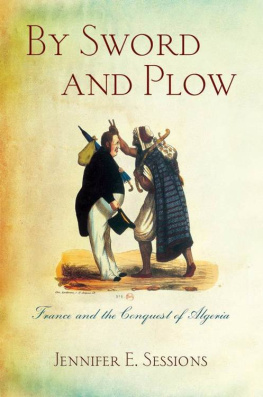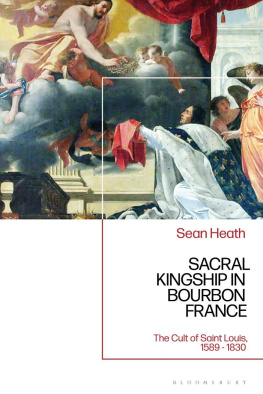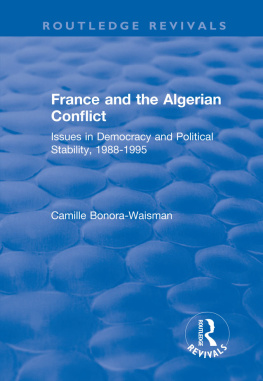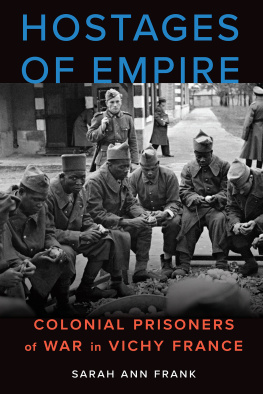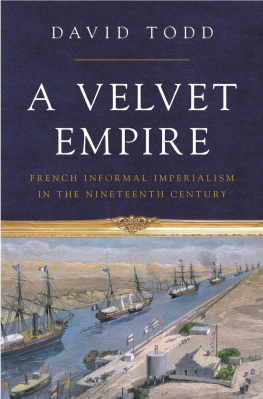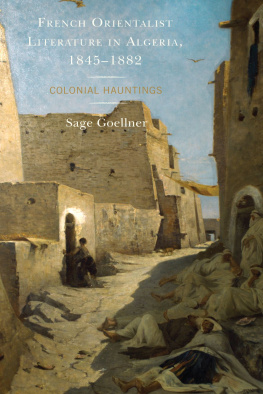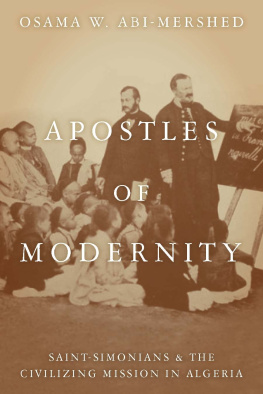JENNIFER E. SESSIONS
BY SWORD AND PLOW
France and the Conquest of Algeria
CORNELL UNIVERSITY PRESS ITHACA AND LONDON
For my parents
Contents
Illustrations
Acknowledgments
IN RESEARCHING AND writing this book, I have incurred debts that my thanks here can only begin to repay. Initial research for this project was supported by grants and fellowships from the Ford Foundation, the French Ministry of Foreign Affairs, the Socit des professeurs franais et francophones dAmrique, and the University of Pennsylvania. The National Endowment for the Humanities, the Getty Research Institute, and, at the University of Iowa, International Programs, the Stanley Foundation-UI Support Organization, and the Office of the Vice President for Research enabled me to complete my research in France and the United States. A Kluge Fellowship at the Library of Congress and support from the University of Iowa gave me time to write. I am grateful for the generous assistance of the many librarians, archivists, and curators who made my research possible. Jean-Marie Lincolas at the Service historique de la Dfense, Valrie Bajou at the Muse de Versailles, and Frdric Maguet at the Muse national des arts et traditions populaires (now Muse des civilisations de lEurope et de la Mditerrane), as well as the interlibrary loan staff at Van Pelt Library at the University of Pennsylvania and the University of Iowa Libraries, deserve particular thanks for their patience with my requests for obscure works. Discovering the riches of French departmental and municipal archives was one of the great joys of this project, as was the kindness of their archivists, who went out of their way to help me locate documents and to make photocopies when I could not visit in person.
My thinking about French colonialism has benefited from the conversation, encouragement, and thoughtful criticism of many people. At the University of Pennsylvania, where this book began, I had the great good fortune to work with Lynn Hunt and Lynn Hollen Lees, and my first thanks must go to them. As a historian, I have learned immeasurably from their teaching and scholarship, and their intellectual influences will be evident in the pages that follow. But each has also been an inspiring model of what it is to be a mentor, a colleague, and a friend. I hope that I can pass on to my own students even part of what I learned from seminars and discussions with them and other Penn faculty. Lee Cassanelli supported my interest in African history, and Susan Sidlauskas encouraged me to consider the visual aspects of colonial culture. Jonathan Steinberg and Marion Kant opened their home, their intellectual enthusiasm, and their friendship to me. My fellows in seminars and discussions both formal and informal made Penn a warm and exciting place to study history.
Many colleagues and friends have read and discussed the various iterations of this book over the years, and I am grateful for their questions, criticisms, and suggestions. Naomi Andrews, Julia Clancy-Smith, Lauren Clay, and Becky Pulju read all or part of the manuscript and offered valuable feedback. FayeLin Bartram, Sarita Patnaik, John Sessions, David Uhrig, and Noelle Yasso provided invaluable research assistance compiling data on French colonial emigration. I would like to thank the two anonymous readers at Cornell University Press, as well as my editor, John Ackerman, for his interest in this book, and Susan Specter for her help in bringing it to fruition.
My colleagues in the History Department at the University of Iowa have been unfailingly generous with their time, ideas, and support. In particular, Lisa Heineman and Johanna Schoen read and commented on chapters. Paula Michaels, Kevin Mumford, Jacki Rand, and Glenn Penny have shared long discussions of colonialism and its cultures. Many other colleagues and friends have enlivened my research, writing, and life. I owe particular thanks to Sung Choi, Brenda Longfellow, Kathy Nasstrom, Jennifer Olmsted, Tracy Osborn, Amanda Owen, Ben Read, Shira Robinson, Rebecca Scales, Rebecca Hartkopf Schloss, Andrea Smith, CJ Voci, and Chuck Walton. Allyson Delnore has discussed all aspects of this project over the years and shared with me her friendship and her knowledge of French imperialism. She read the entire manuscript at a critical point, and this book is much improved for her thoughtful, detailed comments. Jae-Jae Spoon has been a comrade and general co-conspirator in all things French throughout my time in Iowa City. Amy Freund has been unstinting with her warmth, humor, and wisdom. Sophie Bryan, Deborah Hearey, and Sarah Reber have given me support, hospitality, and dear friendships. The Dupuis and de Lussys made me at home in France, and I am grateful for their welcome.
My deepest thanks go to my family, whose love has sustained me through the long years spent writing this book. My sister and her family keep me laughing and put things in perspective. My grandparents offered moral and financial support at many stages of this project. But it is to my parents, who took me to France and taught me to love it, that I owe the greatest debt. My mothers love, advice, and unflagging faith in me keep me going in everything that I do. My father is one of the best historians I know, and his enthusiasm inspired me to follow in his footsteps. He has been a researcher, reader, editor, and sounding board every step of the way, and words cannot convey the depth of my gratitude for his help. For this and so much else, I dedicate this book to them.
Abbreviations
| AC | Archives Cond, Chantilly |
| AD | Archives dpartementales |
| AL | Archives du Louvre, Paris |
| AM | Archives municipales |
| AN | Archives nationales, Paris |
| AP | Archives parlementaires, ser. 2 |
| APP | Archives de la Prfecture de Police, Paris |
| BNEst | Bibliothque nationale de France, Dpartement des Estampes et de la photographie |
| CAOM | Centre des archives doutre-mer, Aix-en-Provence |
| CRANL | Compte-rendu des sances de lAssemble nationale lgislative |
| PVD | Procs-verbaux des sances de la Chambre des dputs |
| RAGA | Recueil des actes du gouvernement de lAlgrie |
| SHD | Service historique de la Dfense, Vincennes |
| TEFA | Tableau de la situation des tablissements franais dans lAlgrie |
Introduction
The Cultural Origins of French Algeria
WHEN THE FRENCH invaded the Ottoman regency of Algiers in the summer of 1830, they took the first step in a process of conquest and colonization that dominated Frances modern imperial history and that has shaped French political culture to this day. Establishing a permanent colony was far from the minds of French planners at the time of the invasion, whose primary aim was to rally support for a tottering regime at home. The expedition of Algiers was, historians agree, not connected with the colonial policy of the Restoration Bourbon monarchy, but a makeshift expedient for internal political consumption, carried out by a government in difficulty seeking the prestige of a military victory. In this, it failed, and King Charles X was overthrown just weeks after Algiers fell. But Charless successor, his cousin Louis-Philippe dOrlans, did not withdraw from North Africa after taking power. Instead, the new monarch expanded the temporary military occupation into a permanent settler colony. By the time Louis-Philippes July Monarchy was overthrown in its turn in February 1848, the French presence in Algeria had swelled to almost one hundred thousand troops and over one hundred thousand European colonists.
Next page
